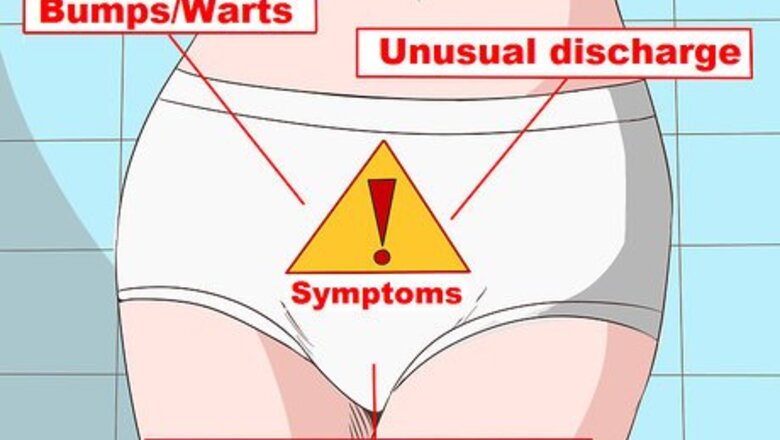
views
Consulting Your Doctor
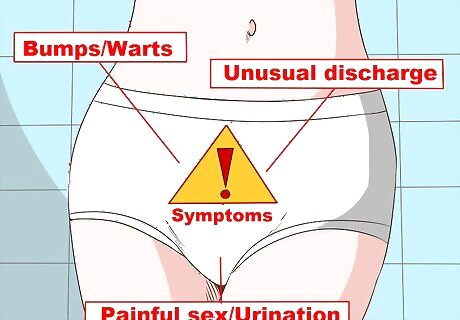
Describe your symptoms. Consider if you have had any new sexual partners. If so, it is a good idea to get tested for STIs just to be on the safe side. But you might also have a specific reason for consulting your doctor. If some concerning symptoms are the reason for your visit, make sure to clearly describe them. However, also be aware that you may have no symptoms at all, so it is a good idea to get tested anyways. Common symptoms include: Bumps or warts near your vagina or mouth. Unusual vaginal discharge. Painful sex or urination.

Talk about your concerns. It is really important that you are completely open and honest with your doctor. Let them know if you have any specific reasons to suspect that have an STI. Remember, they are there to help you, not to judge you. Make sure to tell your doctor if you: Engage in high-risk behaviors, such as sleeping with multiple partners or having unprotected sex. Let your doctor know if you or your partner are experiencing any particular symptoms.
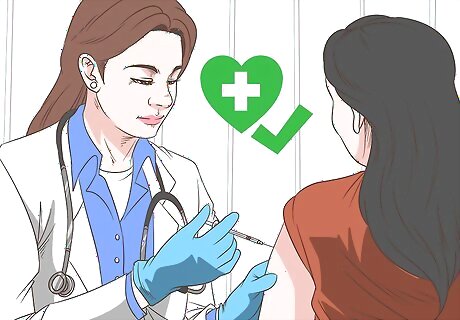
Get a screening test for a panel of STIs. Most prenatal care providers automatically screen their patients for certain sexually transmitted diseases, but if you are unsure, it is best to get tested. Ask your health care provider to test you specifically for a variety of STIs. The type of infection you have will determine your course of treatment. If you are diagnosed with a viral infection that cannot be cured but that can be treated, such as HIV, herpes, or HPV, treatment will be more difficult than for a bacterial infection that can be treated with antibiotics. Do not attempt to treat a sexually transmitted infection independently. Only take a medicine or treatment prescribed by a health professional. Keep in mind that you may not notice any symptoms at all, such as with HIV, HPV, and syphilis, so the best thing to do is to get tested whether or not you have symptoms. This is especially important if you have a new sexual partner.

Understand the risks. Talk to your doctor about why it is so important to get tested and treated. If your STI is left untreated, both you and your baby could be at risk. For example, STIs can increase your risk of miscarriage and preterm birth. Some infections can also be passed to your baby, which can be very serious for a newborn. However, most of these concerns are during delivery, such as preterm birth or passing on the STI to the newborn. In some cases, you can receive drugs prior to delivery to reduce your chances of passing on an STI to your baby.

Ask good questions. When you get tested, you might be overwhelmed by all of the information your doctor gives you. Make sure to take a list of questions with you, so that you remember to get the important answers that you need. Good questions include: Is this treatable? How will this medication affect me? The baby? What are the risks associated with this infection?
Following a Treatment Plan

Follow the instructions of a health care professional for your medication or treatment regimen. Ask your doctor how they intend to treat the infection. Plans will differ based on the results of your panel of tests. Make sure to follow the doctor’s exact instructions. If left untreated, many sexually transmitted infections can cause health problems for you or the baby, including premature delivery, eye infections, and intellectual disability. If you receive antibiotics for the treatment of your condition, follow the medication instructions exactly and do not skip doses or stop taking the treatment until the entire regimen is complete.

Treat a viral infection. Viral infections, in most cases, cannot be cured. But they can be treated. Viral infections that require more advanced treatment to prevent transmission to the baby include Human Papilloma Virus (HPV), Hepatitis C, HIV/AIDS, and herpes. In some cases, antiviral medication can be administered during pregnancy to reduce maternal symptoms. In many cases, viral conditions can pass to the baby during childbirth even if treatment began during pregnancy (as with HIV) or is administered immediately following birth (as with Hepatitis C and herpes).

Tend to a bacterial infection. Bacterial infections that can typically be treated with an antibiotic approved by an obstetrician or prenatal care specialist include gonorrhea, Chlamydia, trichomoniasis, bacterial vaginosis, and syphilis. Certain infections require additional care to ensure that the infection does not pass to the baby at birth (for instance, they will put antibiotic drops into your baby’s eyes after birth if you have gonorrhea).
Keeping Yourself and Your Baby Healthy
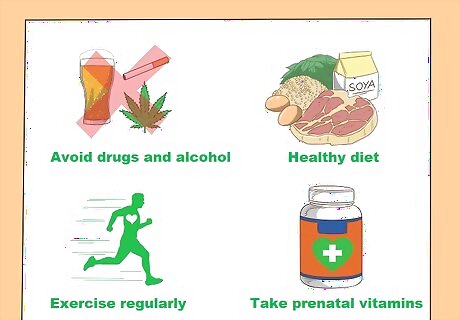
Follow all prenatal guidelines. In addition to treating your infection, you can take other steps to make sure that you have a healthy pregnancy. Ask your doctor to recommend some things you can do to keep both of you healthy. Typical prenatal guidelines include: Avoid drugs and alcohol. Exercise regularly. Eat a healthy diet. Take prenatal vitamins.
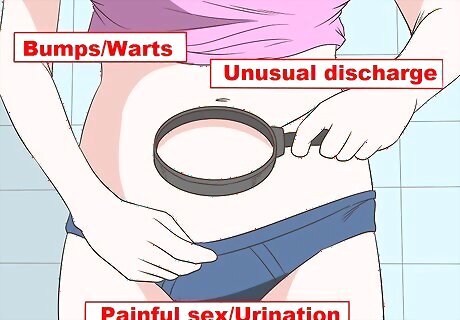
Track your symptoms. Make sure to keep an eye on your symptoms. If they don’t go away, or if they flare up again after a while, talk to your doctor. You can say something like, “My warts came back. Is there another type of treatment we can try?”

Care for yourself emotionally. Pregnancy can be a very emotional experience. Add in the hormones, and the extra stress of an STI, and you’re dealing with a lot. Make sure that you are taking care of your mental health in addition to your physical health. Get plenty of rest. Avoid people or situations that add stress to your life. Make time for activities that you enjoy, such as reading or prenatal yoga.




















Comments
0 comment